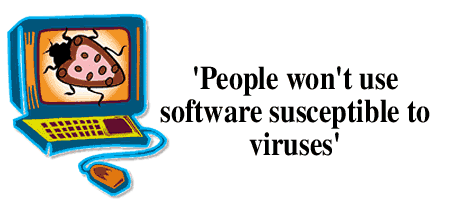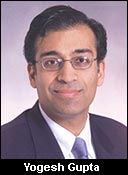Home > Business > Interviews
The Rediff Interview/Computer Associates CTO Yogesh Gupta
September 04, 2003

Yogesh Gupta, Chief Technology Officer, Computer Associates International Inc, is responsible for defining strategy and software solution direction. His office manages technology and research initiatives, cultivating CA's growing intellectual property portfolio.
Gupta served as Senior Vice President, eBusiness strategy, and was pivotal to the CA's evolution as world leading provider of eBusiness management solutions. He was instrumental in the launch and marketing of Unicenter, CA's award-winning family of eBusiness infrastructure management solutions. He spoke to Senior Editor Arthur J Pais in New York last week.
What have you been reading recently?
I am reading B J Fogg's Persuasive Computing and Henry Kissinger's Does America Need a Foreign Policy?
What do you find interesting about it?
Kissinger's book makes a strong case for a cohesive and consistent foreign policy and on America's role in the 21st century. Fogg analyzes how computers can influence people's behavior and discusses how this is being used by business and government organizations to sell, educate and change people's attitudes about a variety of issues. I also read India 2020 by Indian President A P J Abdul Kalam. What I liked about it was it was not about science and technology but the whole society. There was a lot of humanism in it.
 What kind of a reader are you?
What kind of a reader are you?
I read a lot on technology and business. I also love sci-fi and mysteries. I like classic mystery writers such as Arthur Conan Doyle. I have also enjoyed P D James and Ruth Rendell. I loved the latest Harry Potter (Harry Potter and the Chamber of Secrets).
Did you manage to wrest it from your sons?
I let them read it first but I could read it very late into the night.
Who have been your best role models?
My parents. Whatever I learned from them in the first 20 years of life has sustained and inspired me.
What was that?
My father Ram Krishna was a government official. As a district collector he worked tirelessly. I remember going to Delhi to attend a family wedding. On the wedding day, my father got news of a hailstorm in Guna district, Madhya Pradesh. The next day, we drove down back to Guna. He helped build a colony for leprosy patients near Gwalior. He believed rightly that leprosy could be treated.
What did you get from your mother?
My mother Sushila was an elementary school teacher before marriage. She instilled in us ethical values. She taught us to stand by people in good times and bad times.
What is one of the key things that motivated you?
I have always been a person who looked at a half full glass and said it was three fourth full. I was part of the software company Cullinet in San Jose. It was bought over by Computer Associates in 1989. Many peers were upset. But I looked at it as a positive development that we got the resources to do what we wanted to.
What was your vision when a student in Madras?
I believed there would be tremendous innovation in electronics. I wanted to be a part of that. I wanted to be an electronics engineer and create something new. Towards the end of my education at IIT-Madras, I realized software held enormous opportunity for innovation and decided to switch to that for graduate studies.
How did your vision change when you began studies in Wisconsin?
This was the early eighties. I realized software could change the way business is done and people conduct their lives. The basic Internet technologies had come into existence and were beginning to influence how researchers communicated. I believed distributed databases would be one area that would really change the way information is managed and did my graduate work in that area. It led to my first two jobs in the industry.
How did the vision begin to evolve at CA?
Initially, I wanted to help CA get into the distributed systems market with solutions for Unix and later Windows. Over time, I did product marketing and product strategy. I have very much believed as the world continues to get more and more connected, management of technology and security of information will become paramount. That places CA technologies at the center of this exciting new world.
Tell us about your biggest challenge at CA in the beginning.
When I became part of CA, it was focused on mainframe software. One day CA Founder and Chairman Charles Wang asked a group of us how we could go from a billion dollar company to a $10 billion company. I suggested we do software for Unix systems. Six months later I was asked to be a part of the architecture team for Unicenter for Unix, CA's most successful product. When the product was ready, Charles wanted me to run the product's marketing. Having never done marketing, it was scary. I decided to give it my best shot. Since we had a great product and a great sales organization we were tremendously successful.
Last year at a high tech conference you talked of your vision for the way business will change. Tell us more.
I talked about connected automobiles as one example, wherein the car will be connected to any computing devices the driver owns and will be intelligent enough to know the driver is on the way to a meeting and likes Starbucks coffee. The car will instruct the driver how to get to the meeting and then tell him there is a Dunkin Donuts on the way or a Starbucks a few blocks off the course. When the driver chooses Starbucks, the car's software can order the coffee and pay for it as well as send out an alert that he will be 10 minutes late for the meeting.
What factors are important in reaching this connectedness?
It will take several factors to make this possible: information control, information security, information delivery, reliability, business continuity for the data itself, and a new way of thinking about scalability. An extended enterprise needs to have control over its data, including ensuring its security and making it available to employees and partners as they need it. In the connected car example, this includes tapping into a variety of devices so that the software has certain intelligence about the driver.
You said 'technology becomes a companion in that it helps you when you need help.' Please elaborate.
Technology will be aware of what people are trying to do and help do it better. In the car example, technology will notice I'm trying to go to a particular place and help me get there. It will know I like a particular coffee brand and flavor, and have it ready for me. It will become a true helper.
As another example, imagine that every piece of clothing has a tiny chip that knows the fabric, its care instructions and its color. If I put a shirt in the washer with whites that use bleach, the washer will 'talk' to the clothes and find out there is a shirt that should not be bleached and it will not dispense the bleach.
If I put on a shirt and tie that don't go well together, the shirt will warn me to wear a different tie.
You also said the information factors become adopted, companies will need to make their systems more reliable — and the bar for reliability will be raised as well. What makes you feel confident this will be done?
I look at the progress over the past decade and I'm very hopeful. Every organization is looking at their technology infrastructure and trying to make it more reliable and safe. There is more emphasis on security, reliability and business continuity. Over the next decade the emphasis on reliability and safety will change the buying criterion for technology. People will refuse to buy systems that crash daily or even once a week. They won't use software that is susceptible to viruses. They will expect information technology to be as safe and reliable as any other technology they use.
In recent months many big American companies, including Enron, faced negative publicity. Why should the public have confidence in large firms?
I am an enthusiastic believer in the power of capitalism. Otherwise, I would not been in this business. Bad, dishonest and unethical people exist in all areas. Wrongdoers need to be punished.
Thousands of students from India will start studies on American campuses next week. What advice can you give them?
Have an open mind wherever you go and for whatever you do. Everything is different from what we were used to in India, even boiling water. Change can be perceived by some as a threat and by others as an opportunity. When someone has taken a big step to leave India and come to America, they have already taken a big step in the direction of change.
Have you thought of another career?
I was a teaching assistant at Wisconsin during my graduate studies. I briefly considered going into research and being a professor. Once I started working for high tech companies, I guess I enjoyed what I was doing. There was certain amount of inertia too.
If you got tired of a business career, where would you like to go?
I would love to teach. Even now, I think about teaching a course.
Design: Uday Kuckian